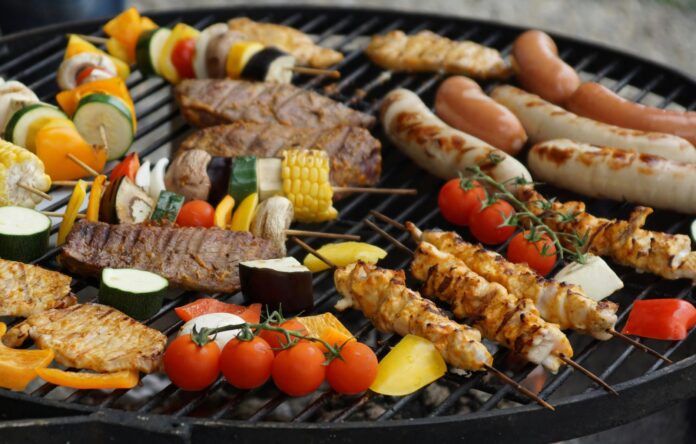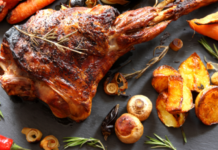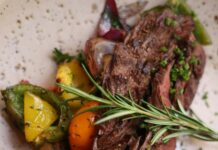- BBQ season is underway, with highs of 28 degrees forecast in the UK and searches for ‘healthy BBQ options’ are up by 232+% in the past 6 months.
- The team at Wren Kitchens has teamed up with a nutritionist and BBQ expert to reveal the fat contents of BBQ favourites and share healthy alternatives to try.
As the UK is set for a sunny heatwave, BBQ season is well underway. When we think about BBQs, we automatically think of chargrilled beef burgers, sausages and halloumi. Whilst they are a seasonal treat, have you ever considered their nutritional values?
With searches for ‘healthy BBQ options up by +232% in the past 6 months1, it seems that many are searching for a leaner option this summer. Luckily, Wren Kitchens has teamed up with nutritionist Daniel Herman, and BBQ cooking expert John Finch to reveal the truth behind the BBQ favourites, and to share healthy alternatives to try instead.
Nutritionist Daniel Herman shares the approximate calories and fat content in popular BBQ items:
|
Item |
Calories |
Fat |
|
Sausages |
150-200 |
12-20g |
|
Beef Burgers |
250-300 |
15-20g |
|
Chicken Wings |
80-100 |
5-7g |
|
Halloumi |
90 |
7g per ounce |
|
Corn on the Cob |
70-100 |
1-2g per ear |
|
Wedges |
150-200 |
6-10g |
|
Potato Salad |
200-350 |
12-20g |
|
BBQ Sauce |
70 |
0 per tablespoon |
|
Mayonnaise |
90 |
10g per tablespoon |
|
Burger Sauce |
50-100 |
5-10g per tablespoon |
|
Chimichurri |
50 |
5g per tablespoon |
|
Cheese |
110 |
9g per ounce |
|
Bacon |
42 |
3g per slice |
Nutritionist Daniel Herman shares the approximate calories and fat content for healthy BBQ alternatives:
|
Item |
Calories |
Fat |
|
Turkey Sausages |
100-150 |
6-10g per sausage |
|
Lean Beef Burgers |
200 |
10g per patty |
|
Skinless Chicken Breast |
120 |
2.5g per 4oz |
|
Vegetable kebabs |
50-70 |
1-2g per skewer |
- Turkey sausages have half the fat as normal sausages.
- Lean beef burgers have a minimum 50 calories less than normal beef burgers.
- Skinless chicken breast has 2.5g less fat than chicken wings.
John Finch, BBQ cooking expert and food writer shares his top BBQ tips, including how to make a foods healthier, homemade sauce secrets, and common mistakes people make when BBQ cooking:
The secrets to making a BBQ healthier
“There is nothing that you can’t cook on a BBQ, that you can’t cook in a kitchen. Healthy meals such as stir fries can be taken outside to cook too, and there’s lots of different accessories available to do this,” affirms John.
“There is a high amount of sugar content in supermarket pre-marinated sauces or seasonings, so it’s best to avoid and prepare your own, as suggested below, so you are aware of the nutritional content. Firstly, because you don’t want the additional additives in your food, but secondly, there is quite an intense heat when cooking on a BBQ, so the sugars will tend to burn and turn acrid. If you really want to add them, put a little bit on the end and move it to an indirect area of the grill, rather than a searing flame,” he adds.
Homemade sauce secrets
“By nature, BBQ sauce is a sweet, sugar-based condiment. I do chicken with a mix of olive oil, lemon juice, fresh oregano, or you can use red wine, vinegar and herbs for a tangy flavour, which creates tender meat due to the acidity,” says John.
For his golden gem…Greek yogurt. “Greek yoghurt is great because it carries flavours quite neutrally. The yoghurt base burns off on a grill and leaves what you have mixed in with that yoghurt. If you want to use roast harissa, chili, or tandoori with Greek yoghurt on the grill, you will end up with the flavours of the meat and the yoghurt itself disappears,” adds John.
BBQ foods to avoid
John advises what to avoid if you want a leaner BBQ. “Avoid the processed foods. Things like sausages, and cheap supermarket burgers that have high-fat content but also the preservatives and chemicals in.”
How to control portion sizes
“Have a nice balance and plan your menu,” advises John. “It’s no different from planning portion sizes in the kitchen, work out how many people you have coming and the number of grams of protein you are going to cook for each person. I enjoy serving food from big platters off the grill so people can help themselves, pick and choose what they fancy and are less inclined to pile the plate high,” he explains.
“The average restaurant will give around 70-110 grams of protein per dish so if you are aiming for that, you can always supplement less healthier elements of your BBQ too. If you’re cooking sausages, you can supplement that with some nice salads, grilled veg, or prawns. It’s keeping a nice healthy balance of what is going to be served,” he says.
Are there any superfoods that work well on a BBQ?
“I really like the idea of eating the rainbow so if you have lots of different coloured vegetables on your plate, then that’s giving you a lot of the nutrients and vitamins you need. Spring cabbages are brilliant just seared on the grill and add a little bit of oil when that goes on, the edges get a little bit charred, and it brings rich flavour,” says John.
“Cauliflower shawarma is great, roast the whole cauliflower on the grill and then slice it into tacos. You can also grill fruits and create a yakitori skewer. Make them with fresh pineapple, chicken, and different coloured peppers,” adds John.
The full blog on healthy BBQ foods can be found here: https://www.wrenkitchens.com/blog/nutritionist-approved-bbq-feasts
Help keep news FREE for our readers
Supporting your local community newspaper/online news outlet is crucial now more than ever. If you believe in independent journalism, then consider making a valuable contribution by making a one-time or monthly donation. We operate in rural areas where providing unbiased news can be challenging. Read More About Supporting The West Wales Chronicle
























